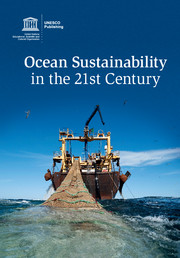Book contents
- Frontmatter
- Contents
- List of contributors
- Acronyms and abbreviations
- Foreword by Irina Bokova, Director-General of UNESCO
- Foreword by Thomas E. Lovejoy
- Preface
- Acknowledgements
- 1 Issues regarding oceans and opportunities: an introduction to the book
- 2 Main human uses of ocean areas and resources, impacts, and multiple scales of governance
- 3 Physical and chemical changes in the ocean over basin-wide zones and decadal or longer time-scales: perspectives on current and future conditions
- 4 Knowledge and implications of global change in the oceans for biology, ecology, and ecosystem services
- 5 A new perspective on changing Arctic marine ecosystems: panarchy adaptive cycles in pan-Arctic spatial and temporal scales
- 6 Ecosystem approach and ocean management
- 7 Challenges in using valuation in ecosystem-based management in a marine context: the case of UK Marine Protected Area designation
- 8 The contribution of international scientific cooperation and related institutions to effective governance for the oceans: the cases of regional tsunami early warning systems and the Argo project
- 9 Emerging and unresolved issues: the example of marine genetic resources of areas beyond national jurisdiction
- 10 The assumption that the United Nations Convention on the Law of the Sea is the legal framework for all activities taking place in the sea
- 11 The legal regime of outer space in light of the Law of the Sea
- 12 Towards sustainable oceans in the 21st century
- Index
Foreword by Thomas E. Lovejoy
Published online by Cambridge University Press: 05 May 2015
- Frontmatter
- Contents
- List of contributors
- Acronyms and abbreviations
- Foreword by Irina Bokova, Director-General of UNESCO
- Foreword by Thomas E. Lovejoy
- Preface
- Acknowledgements
- 1 Issues regarding oceans and opportunities: an introduction to the book
- 2 Main human uses of ocean areas and resources, impacts, and multiple scales of governance
- 3 Physical and chemical changes in the ocean over basin-wide zones and decadal or longer time-scales: perspectives on current and future conditions
- 4 Knowledge and implications of global change in the oceans for biology, ecology, and ecosystem services
- 5 A new perspective on changing Arctic marine ecosystems: panarchy adaptive cycles in pan-Arctic spatial and temporal scales
- 6 Ecosystem approach and ocean management
- 7 Challenges in using valuation in ecosystem-based management in a marine context: the case of UK Marine Protected Area designation
- 8 The contribution of international scientific cooperation and related institutions to effective governance for the oceans: the cases of regional tsunami early warning systems and the Argo project
- 9 Emerging and unresolved issues: the example of marine genetic resources of areas beyond national jurisdiction
- 10 The assumption that the United Nations Convention on the Law of the Sea is the legal framework for all activities taking place in the sea
- 11 The legal regime of outer space in light of the Law of the Sea
- 12 Towards sustainable oceans in the 21st century
- Index
Summary
Elizabeth Kolbert, in Field Notes from a Catastrophe, paints a vivid picture of an oceanographic sample of sea butterflies or pteropods (tiny snails with ‘feet modified like little flapping wings to keep the animals from sinking in the water column’). Held overnight, by the morning the CO2 exhaled by the tiny animals had rendered the seawater in the container sufficiently acid that it etched their shells. This was one of the first inklings of ocean acidification, now recognized as a major consequence of global change, and an indication of the sensitivity of the marine environment.
Picture if you will, a coral reef submerged in a pleasant tropical sea. It is a colourful blend of multiple stakeholders: the coral itself, the aquatic organisms that feed from it, their waste that adds in time to the cycle of life, and the local human communities which have relied on the reef's productivity from time immemorial. It lies in delicate balance, where the alteration of one of these aspects leads to the collapse of the system. Even a change in the composition of the water itself can bring the whole system down.
This picture is an appropriate metaphor for the complex environmental and ecological change that characterizes the oceans today. The future of the planet's oceans involves diverse constituencies, from indigenous fishermen to UN lawyers, global tourists, and developing world policy makers. If each of these actors were asked how they saw the ocean, their answers would be quite different. The chapters in this book illuminate our knowledge of the oceans today, while reflecting the aspirations and expectation of these diverse constituencies.
Although ‘global warming’ is but one element of ‘global environmental change’, the warming of the oceans is nonetheless important in its own right. The warming is pervasive and goes 2000 metres deep and yet deeper. There will be dramatic effects on moisture flux, nutrient supply, and climate variability. Thermal expansion of water, in addition to melting ice on land and glacier retreat worldwide, will cause dramatic sea-level rise. About 600 million people live within 10 metres of sea level.
- Type
- Chapter
- Information
- Ocean Sustainability in the 21st Century , pp. xix - xxiiPublisher: Cambridge University PressPrint publication year: 2015

